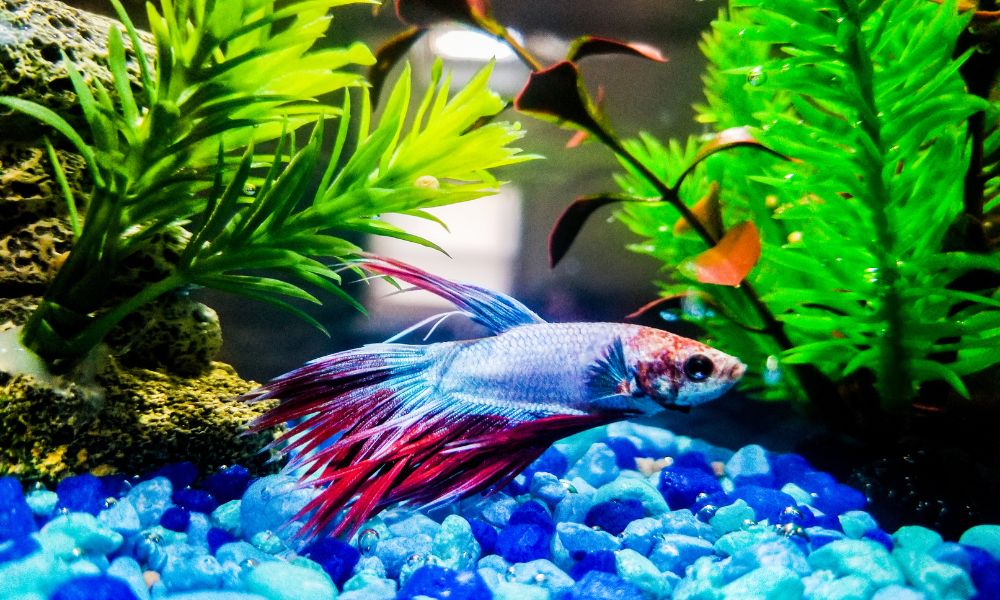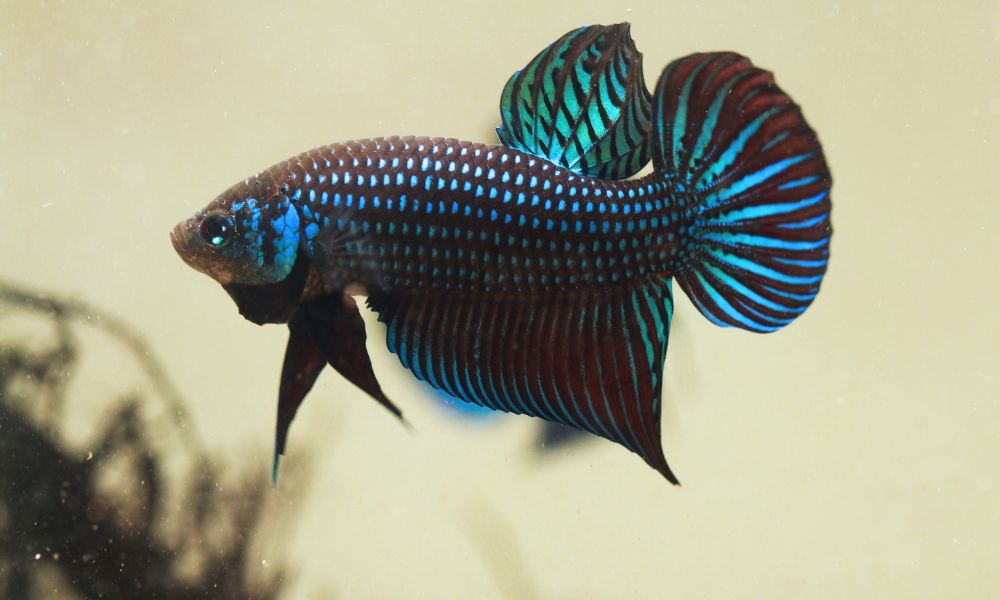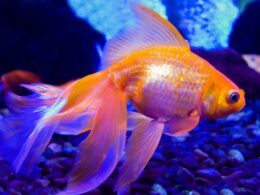In this article Show
Are betta fish lazy? This question often surfaces among aquarium enthusiasts and those new to fishkeeping. As an experienced aquarist, I’ve observed various fish behaviors, and betta fish, with their vibrant colors and elegant fins, are a common subject of this query.
Contrary to the widespread belief, betta fish are not inherently lazy. Their behavior in a home aquarium can be quite complex and is influenced by several factors.
In this article, we’ll explore what shapes the activity levels of betta fish. From their natural habitat to the conditions in a home aquarium, many aspects contribute to how these beautiful fish behave. So, let’s get into the heart of this matter and unravel the truth behind the activity patterns of betta fish.
Are betta fish lazy?
Yes, betta fish are not inherently lazy. This common misconception about betta fish’s activity level often stems from a lack of understanding of their natural behavior and needs. In a well-maintained aquarium, betta fish exhibit a range of activities that reflect their health and vitality. Factors such as tank size, water quality, and environmental enrichment significantly influence their behavior.

Betta Fish Behavior Explained
1. Betta Fish in the Wild
In their natural habitat, betta fish are native to the warm, shallow waters of Southeast Asia, where they thrive in rice paddies, slow-moving streams, and even small ponds. In these environments, bettas are known for their territorial nature, especially the males.
They exhibit a variety of behaviors, including patrolling their territory, building bubble nests, and occasionally engaging in displays of aggression to defend their space. These fish are opportunistic feeders, actively hunting for small insects and larvae.
Their behavior in the wild is a complex mix of foraging, nest building, and territory defense, showcasing their adaptability and resilience.
Betta Fish in Captivity
When it comes to betta fish kept in home aquariums, their behavior can be markedly different, largely influenced by the conditions they are kept in. In a well-set-up tank that mimics aspects of their natural environment, betta fish can be quite active and engaging.
They often explore their surroundings, interact with various tank elements like plants and decorations, and can even recognize their caregivers. However, if kept in suboptimal conditions, like small bowls or tanks without proper filtration and heating, their activity levels can decrease significantly, leading to the misconception that they are lazy creatures.
Normal Activity Patterns
A healthy betta fish in captivity should exhibit a good balance of activity and rest. They often swim across different levels of the tank, flare their gills and fins to display their mood or territorial instinct, and may even interact with other tank mates if they are non-aggressive and compatible.
It’s normal for them to have periods of rest, often nestling in plant leaves or other hiding spots in the tank. However, consistent lethargy or a lack of interest in their surroundings can be a sign of stress or poor health.
Factors Influencing Betta Fish Activity
The activity levels of betta fish are significantly influenced by various factors including their tank environment, diet, and overall health. Understanding and optimizing these elements can lead to a more vibrant and active betta.
1. Betta Fish Tank Environment
The environment in which a betta fish lives plays a crucial role in determining its activity level. A tank that is too small or inadequately heated can cause stress and lethargy in bettas. They thrive in tanks that are at least 5 gallons in size, with a temperature range of 75-80°F and a pH between 6.5 and 7.5.
The presence of plants and hiding spots can also encourage natural behaviors like exploring and nest-building. Additionally, a clean tank with a gentle filtration system ensures a stress-free environment for bettas, promoting more active behavior.
2. Betta Fish Diet
Nutrition is another critical factor. A well-balanced diet contributes to the energy levels and overall health of betta fish. They are carnivorous by nature, so a diet rich in protein is essential.
High-quality betta pellets, along with occasional treats like daphnia, brine shrimp, or bloodworms, can keep them healthy and active. Overfeeding, however, should be avoided as it can lead to health issues like bloating and lethargy.

3. Betta Fish Health
A betta’s health directly impacts its activity levels. Health issues, often stemming from poor water conditions or an unsuitable diet, can lead to decreased activity. Common signs of distress or illness in betta fish include clamped fins, lack of appetite, and unusual floating or sinking.
Regular monitoring of water quality and vigilant observation for any signs of illness are crucial. Prompt action, including water changes, diet adjustments, or even veterinary consultation, can restore and maintain their well-being and activity levels.
Creating an Ideal Environment for Betta Fish
Setting up a betta-friendly aquarium is essential for the well-being and activity of these popular fish. Here are some tips and considerations to keep in mind:
1. Tank Size and Space
A common misconception is that betta fish can thrive in tiny bowls or vases. In reality, bettas need space to swim and explore. A tank of at least 5 gallons is recommended. This provides enough room for swimming and reduces the buildup of waste, maintaining a healthier environment.
2. Water Quality and Conditions
Water quality is paramount in betta care. Betta fish require a water temperature between 75-80°F, so a reliable heater is a must in most climates. The pH level should be maintained between 6.5 and 7.5.
Regular water changes, typically 25-50% per week, are crucial to remove toxins and keep the water fresh. A gentle filtration system is also important to keep the water clean without creating strong currents, as bettas prefer calm waters.
3. Hiding Spots and Enrichment
Providing hiding spots is crucial for betta fish, as it helps them feel secure and reduces stress. Decorations like caves, tunnels, and live or silk plants not only make the aquarium more aesthetically pleasing but also offer places for bettas to rest and explore. Avoid sharp or rough decorations that could damage their delicate fins.
4. Lighting and Day-Night Cycle
Proper lighting is important for maintaining a healthy day-night cycle, which helps regulate the betta’s biological clock. However, too much light can lead to algae growth and stress. Around 8-10 hours of light per day is usually sufficient.
5. Avoid Overcrowding
While some bettas can coexist with certain peaceful, small fish or snails, it’s important to avoid overcrowding the tank. Overcrowding can lead to stress, aggression, and poor water quality, all of which are detrimental to betta health.
6. Regular Maintenance
Consistent maintenance is key in betta care. This includes monitoring water parameters, cleaning the tank, and checking the functioning of equipment like filters and heaters. A well-maintained tank is essential for the health and happiness of your betta fish.
In conclusion, setting up a betta aquarium involves more than just filling a tank with water. It requires consideration of space, water quality, tank enrichment, and regular maintenance. By following these guidelines, you can create a thriving environment that encourages your betta fish to display their natural behaviors and live a healthy, active life.










